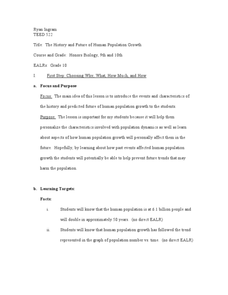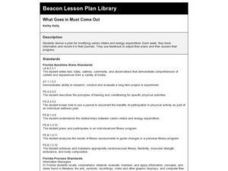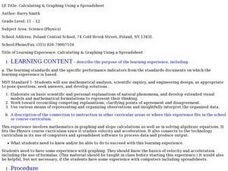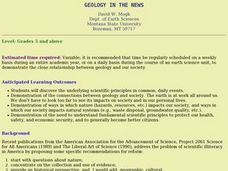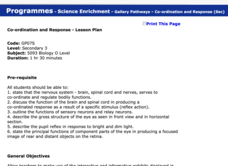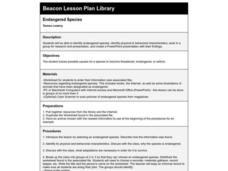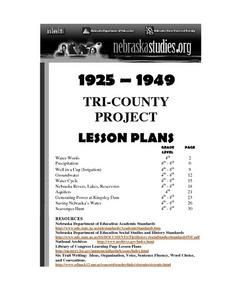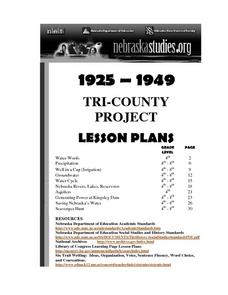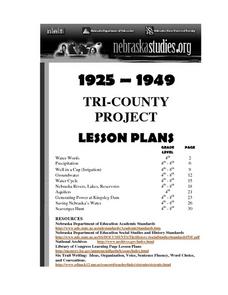Curated OER
Still Movement
Young scholars explore constant motion. Using photography equipment and a dark room, students develop photographs that depict motion. Young scholars demonstrate the proper use of photograph equipment.
Curated OER
Subject Selection in Clinical Trials
Students design and conduct an experiment to test a hypothesis. They create a question/objective based on the results of their experiment that can be answered by performing a human clinical trial. Students write inclusion and exclusion...
Curated OER
Detection Detective
Students describe what each detection method uses and rank the wavelengths of each if appropriate. They answer questions about absorption, importance of materials and explain differences. Students make sure they describe diagnostic uses...
Curated OER
Create A DNA Fingerprint
Students engage in a lesson that is about the DNA molecule and focuses upon the sequencing of proteins to identify individuals. They conduct research using a variety of resources and then complete the activities included in the 3 parts...
Curated OER
Shelter
Students study shelter and how plants, animals, and people must have shelter to survive. In this shelter instructional activity, students read paragraphs about various shelters and their necessity with plants, animals, and people.
Curated OER
Funky Food Farm
Students research about ways to keep food from spoiling. In this health science instructional activity, students design an experiment to keep the ice cubes from melting. They present their designs and results in class.
Curated OER
The History and Future of Human Population Growth
Young scholars create a timeline of human population growth based on guided reading. In this biology lesson, students analyze the trend of how population increased over time. They share their findings in class.
Curated OER
What Goes in Must Come Out
Students monitor their calorie intake and energy expenditure. They keep track of daily data in a journal and assess and adjust their diets as appropriate.
Curated OER
Calculating & Graphing Using a Spreadsheet
Students use the lab apparatus to calculate the average velocity and average acceleration at several points and record the data. They use the spreadsheets to plot distance vs. time, velocity vs. time and acceleration vs. time graphs.
Curated OER
Chip Challenge School Registration Form
In this registration instructional activity, information is collected on the school and classes participating in the Chip Challenge. Teachers are provided with Chip Pal responsibilities.
Curated OER
Brine Shrimp
Learners gain a sense of the delicacy and complexity of a living organism and the rather narrow range of conditions under which it can live.
Curated OER
At Home on the Prairie
Learners discover the importance of the bison within the prairie ecosystem and Native American culture, and explain the importance of habitat and place to living organisms.
Curated OER
Local Heart Rates
Students determine the type of data needed to test their inferences. As homework, they check and record heart rates of fellow students, teachers and family members. During their next class period, students enter all data into the database.
Curated OER
Geology in the News
Students discover the underlying scientific principles in common, daily events.
Curated OER
Organization 1: Look at What I Organized!
Students recognize that organizing things can make it easier to find things later.
Curated OER
Co-ordination and Response - Lesson Plan
Eleventh graders explain why colour blindness is more common in men than women.
Curated OER
Endangered Species
Students conduct Internet research on endangered species. They select an endangered species, identify its physical and behavioral characteristics, and create a Powerpoint presentation.
Curated OER
"Tri-County" Project--Ground Water
Students explore data on some of the landforms in Nebraska to distinguish between porous and nonpremeable soils. The state's groundwater is investigated.
Curated OER
"Tri-County" Project--Ogallala Aquifer
Students explore the Ogallala Aquifer in the state of Nebraska. The signs of pollution found are examined and the data classified.
Curated OER
"Tri-County" Project--Rivers Lakes Reservoirs
Students examine data about the rivers, lakes, and reservoirs in the state of Nebraska. An understanding of the political implications of boundaries is developed.
Curated OER
Tri-County Project: Precipitation
Students examine and research the annual rainfall in Nebraska. They create a map of the annual rainfall in Nebraska and use the map to develop explanations of settlement.
Curated OER
"Tri-County" Project--Water Cycle
Students analyze the parts of the water cycle through research and experimentation. Particular attention is paid to the processes of evaporation and condensation.
Curated OER
Flowers -- The Smile of Divine Love
Students collect quotations and information on flowers. They write poems about flowers and grow their own. They draw pictures of different flowers and add descriptions of them.
Curated OER
Researching Intermountain West Earthquakes
Students research earthquakes using the internet and newspapers. They discover the earthquake's effect on people and buildings. They report their findings to the class.








